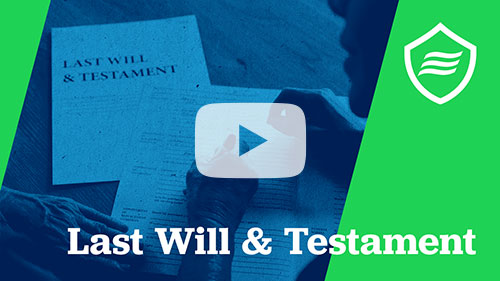LAST WILL AND TESTAMENT
What It Is & Why You Need One
A last will and testament expresses final wishes, details asset distribution and names guardians for children.

Last Will and Testament
A last will and testament is a legal document that outlines your wishes regarding the distribution of your assets and the care of any minor children after your death. This formal declaration allows you to communicate your intentions about who will receive your property, who will be responsible for carrying out those wishes (your executor), and who will become the guardian of your children if necessary. Creating a valid will can ensure your estate is handled according to your preferences rather than state intestacy laws.
Why Do You Need a Will?
You need a last will and testament to maintain control over your legacy and protect your loved ones. This estate planning document directs assets to your chosen beneficiaries rather than default distributions determined by state laws. A will allows you to name guardians for minor children and a trusted executor to manage your estate. If you don't have a will, a court may decide these matters, potentially causing family disputes and unnecessary legal expenses. A properly executed will also provides peace of mind by documenting your final wishes and addressing your family's future.


Key Elements of a Valid Last Will and Testament
For a last will and testament to be legally binding, it must include several essential elements and meet specific requirements that vary somewhat by state.
Legal Requirements
- Testamentary capacity: You must be of sound mind when creating your will, understanding the nature of the document, your assets, and your beneficiaries.
- Voluntary creation: The will document must be created freely without coercion, fraud, or undue influence from others.
- Proper execution: Most states require the will must be in writing (typed or printed), signed by the testator (person making the will), witnessed by at least two disinterested parties who also sign the document, and some states require notarization for self-proving wills.
- Clear intent: The document must clearly express your intention that it serves as your will.
Common Will Provisions
While varying in detail, most valid wills include:
- Identification of yourself as the testator
- Revocation of previous wills
- Appointment of an executor
- Distribution instructions for assets
- Guardian designations for minor children (if applicable)
- Signature and date

Benefits of Creating a Last Will and Testament
Without a will, your assets could be distributed according to state intestacy laws, which may not align with your wishes, and important decisions about guardianship for minor children and estate administration would be left to the court-supervised probate process.
Beyond the practical benefits, creating a last will and testament provides peace of mind, reducing uncertainty and the potential for family disputes that might arise if you left no clear instructions behind.
Last Will and Testament vs. Living Trust: Key Differences
While both wills and living trusts are estate planning tools, they serve different purposes and operate in distinct ways.
| Feature | Last Will and Testament | Living Trust |
|---|---|---|
| When it takes effect | After death only | Can function during life and after death |
| Probate process | Must go through probate | Can avoid probate process |
| Privacy | Becomes public record | Remains private |
| Control during incapacity | Provides no protection | Allows for management if you become incapacitated |
| Complexity to create | Generally simpler and less expensive | More complex and costly to establish |
| Ongoing maintenance | Minimal after creation | Requires funding and potential ongoing management |
| Contestability | Can be challenged in probate court | More difficult to contest successfully |
| Guardian designations | Can name guardians for minor children | Cannot name guardians (requires a will) |
A will is suitable for those who need to designate guardians for minor children, and for whom probate avoidance isn't a major concern.
Conversely, a revocable living trust presents advantages for those prioritizing probate avoidance, especially when owning property across multiple states. Individuals who value privacy often prefer trusts, as do those seeking protection in case of incapacity. Trusts generally offer better solutions for blended families or those with special needs and provide greater protection against potential contests to your wishes. Many comprehensive estate plans strategically utilize both tools, with a pour-over will working alongside a trust to help ensure complete coverage of all assets and contingencies.
When to Update Your Last Will and Testament
A will isn't a "create it and forget it" document. Regular reviews and updates could ensure it continues to reflect your wishes as circumstances change.
Life Events That Necessitate Updates
Family Changes:
- Marriage or divorce
- Birth or adoption of children or grandchildren
- Death of a beneficiary or executor
- Estrangement from previously named beneficiaries
- New step-family relationships
Financial Changes:
- Significant increase or decrease in asset value
- Acquisition of new property
- Sale of property specifically mentioned in the will
- Starting or selling a business
- Receiving a substantial inheritance
Legal/Location Changes:
- Moving to a different state
- Changes in tax laws
- Changes in estate planning laws
- New estate planning goals
Common Misconceptions About Last Wills And Testaments
What happens if I die without a last will and testament?
If you die without a valid will (intestate), state law determines who receives your assets according to a fixed formula, typically prioritizing spouses and blood relatives. The court will appoint an administrator to handle your estate and potentially a guardian for minor children without your input. This often results in longer probate proceedings, higher costs, and distributions that may not align with your wishes.
Who should I choose as my executor?
The ideal executor is trustworthy, organized, detail-oriented, and good with finances. Consider choosing someone who:
- Is willing and able to serve in this role
- Lives relatively close to you
- Has the time to devote to settling your estate
- Can remain impartial when dealing with beneficiaries
- Has sufficient financial and administrative skills
Many people choose a spouse, adult child, sibling, or close friend, often with a professional backup such as a trust company for complex estates.
Can a will be contested and on what grounds?
Yes, wills can be contested, though successful challenges are relatively rare. Valid grounds for contesting a will include:
- Improper execution (not meeting state legal requirements)
- Lack of testamentary capacity (the testator wasn't of sound mind)
- Undue influence (someone improperly pressured the testator)
- Fraud or forgery
- Existence of a more recent valid will
To minimize contest risks, work with an experienced attorney, clearly document your capacity and intentions, and consider including a no-contest clause where permitted by state law.
Summary
Creating a last will and testament is one of the most important steps you can take to protect your loved ones and express your final wishes. Though it requires confronting difficult questions about mortality, the peace of mind that comes from having a properly executed will is invaluable.
Remember, estate planning is highly individualized and often involves complex legal and tax considerations. Working with qualified estate planning professionals can help ensure you accomplish your goals while complying with all legal requirements.
By taking the time to create a comprehensive estate plan, you're creating a lasting legacy that reflects your values and protects those you care about most.





